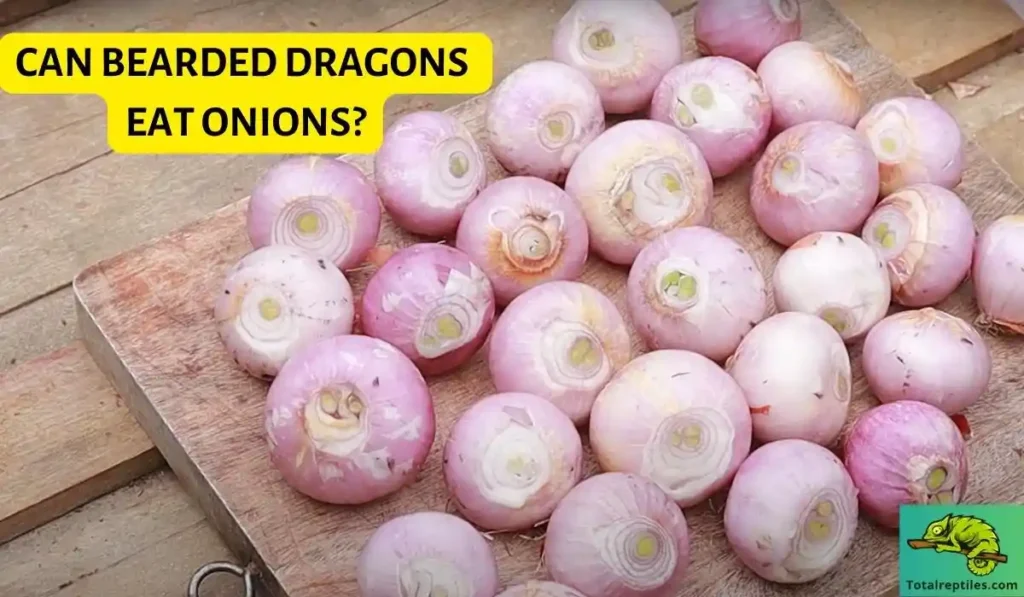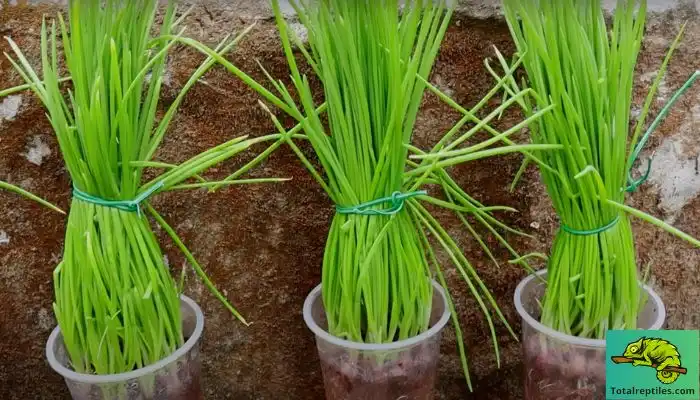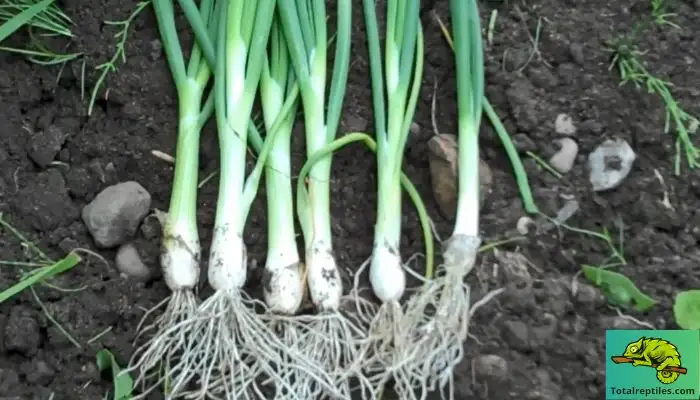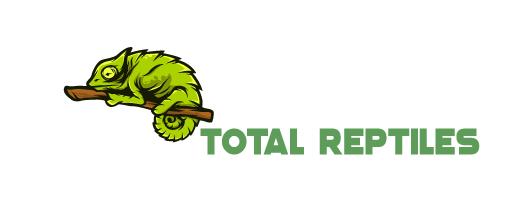Whether raw, dehydrated, or cooked, onions should never reach their plate.
Bearded dragons should never eat onions due to their high acidity, which can lead to severe digestive complications.
Once ingested, these compounds may launch a silent assault on their red blood cells, leading to distressing conditions like hemolytic anemia, Heinz body anemia, and methemoglobinemia. So, it is not safe to try for your pets.
These seemingly innocent veggies are way too acidic for the delicate digestive system of bearded dragons.
Feeding them onions could lead to serious complications; we don’t want that for our reptilian pals.
So, let’s steer clear of onions and stick to their safe and nutritious diet for a healthy and happy dragon!

Can bearded dragons eat green onions?
The short answer is no; bearded dragons should not eat any type of onions. This includes green onions, yellow onions, white onions, red onions, and other varieties. Onions contain compounds that can be toxic and cause health issues for bearded dragons.
Specifically, onions contain disulfides and sulfides that can disrupt digestion and cause gastrointestinal upset in bearded dragons.
Onions also contain thiosulphate, which can cause hemolytic anemia if large amounts are consumed. Small amounts may not cause immediate issues, but onions have no nutritional value, and even small quantities can be harmful over time.
Instead of onions, focus on providing bearded dragons with a healthy, varied diet. Staple foods like leafy greens like collard, mustard, turnip, endive, and bok choy. Squash, sweet potatoes, berries, and other fruits can also be fed.
Live insects like crickets, worms, and roaches should comprise 15-20% of adult bearded dragon diets.
A nutritious, balanced diet will ensure a long, healthy life for your bearded dragon without any onions.

Risks and Potential Health Issues
Regarding onions and bearded dragons, the repercussions of ingestion can be dire.
Let’s get straight into the risks and potential health issues that can cast a shadow on our reptilian companions’ lives.
Digestive Problems Caused by Onions
Bearded dragons possess sensitive digestive systems, finely tuned to their natural diet. Onions, however, can upset this delicate balance, leading to digestive distress, diarrhea, and stomach discomfort. These symptoms are the body’s warning signs that onions are not meant for them.
Anemia and Hemolytic Effects on Bearded Dragons
The perilous compounds in onions, such as organosulfides and thiosulphates, can trigger a domino effect within the bloodstream of bearded dragons.
These toxins cause the breakdown of red blood cells, leading to a condition known as hemolytic anemia. Anemia can cause weakness, lethargy, and a general decline in their health.
Impact on the Liver and Other Organs
Beyond the blood, onions can cast a dark cloud on the liver and other vital organs. The liver, responsible for processing toxins, bears the brunt of onion-induced harm. Prolonged exposure can lead to liver damage, further affecting their overall well-being.
Handling Accidental Ingestion of Onions: Quick Action and Care for Bearded Dragons
Discovering that your bearded dragon has accidentally nibbled on onions can be nerve-wracking. But fear not, as swift action and proper care can make all the difference in ensuring your scaly companion’s well-being.
Immediate Steps to Take if a Bearded Dragon Consumes Onions
First and foremost, remain calm and focused. Time is of the essence, so take these immediate steps to mitigate the potential harm:
Remove Onions
If onions are still within reach, promptly remove them from your bearded dragon’s vicinity to prevent further consumption.
Seek Veterinary Assistance
Contact your reptile veterinarian or an emergency pet clinic immediately. They will provide precise guidance tailored to your dragon’s situation.
While inducing vomiting might seem like a logical response, it’s essential to tread cautiously. Unlike some animals, bearded dragons do not easily vomit on their own.
Attempting to induce vomiting without professional guidance can lead to further complications and discomfort for your pet.
Post-Emergency Care and Observation
Following any medical intervention, it’s crucial to provide gentle post-emergency care to aid your bearded dragon’s recovery:
Isolate and Monitor
Place your dragon in a comfortable, stress-free environment for observation. Monitor their behavior, appetite, and bathroom habits closely.
Hydration
Encourage hydration by offering clean, fresh water. Proper hydration is vital for their overall well-being.

Avoiding Onion Contamination: Keeping Your Bearded Dragon Safe
As responsible bearded dragon owners, safeguarding our dragons from onion exposure is paramount. We can create a safe environment and prevent accidental contamination by taking proactive measures.
Preventing Cross-Contamination of Food Items
Be diligent in separating your bearded dragon’s food from any onions or onion-related products in your kitchen. Use separate utensils, cutting boards, and preparation areas to avoid unintentional mixing.
Identifying Hidden Sources of Onions in the Habitat
While we may be vigilant with food, other unsuspecting sources of onions might still lurk in the habitat.
Be mindful of decorative elements, such as onion-shaped ornaments or artificial plants with onion-like foliage. These seemingly harmless adornments can seriously threaten your bearded dragon’s health.
Ensuring Safe Interactions with Other Pets
If you have other pets at home, take extra precautions to ensure a harmonious living environment. Educate all family members about the dangers of feeding onions to bearded dragons.
Clear communication and supervision during pet interactions can prevent unintended incidents.
Being an Onion-Detective: Checking Commercial Foods
When choosing commercial reptile diets or treats for your bearded dragon, become an onion-detective.
Read labels carefully to ensure no hidden onion ingredients could endanger your pet.
Let’s ensure their habitat is free from onion contamination, guaranteeing their health and happiness in a space tailored to their reptilian needs.
FAQ
1. Can bearded dragons eat scallions?
Bearded dragons should not eat scallions or any onion family members, including onions, garlic, and leeks. These vegetables contain compounds that can harm bearded dragons and other reptiles. These compounds can lead to digestive problems, toxicity, and organ damage if consumed in large quantities.
2. Can bearded dragons eat cooked onions?
No, cooked onions are equally harmful to bearded dragons as raw ones. The toxic compounds remain intact even after cooking, posing risks to their health.
3. Are there safe ways to introduce onions to bearded dragons’ diets?
It’s best to avoid introducing onions to their diet altogether. Their sensitive digestive systems cannot tolerate the toxins found in onions.
4. Can bearded dragons eat onion leaves?
Not recommended.
5. Are there any natural remedies for onion poisoning in bearded dragons?
There are no proven natural remedies for onion poisoning. If your bearded dragon ingests onions, seek immediate veterinary care.
6. Can bearded dragons eat red onions?
Red onions are equally toxic to bearded dragons as other onion varieties. They should never be included in their diet.
Conclusion
So, onions and bearded dragons are not a match made in reptilian paradise.
The dangers of onions, veiled within their layers, threaten our scaly friends’ well-being.
To nurture their health and happiness, let’s embrace a diet devoid of these risky veggies.

